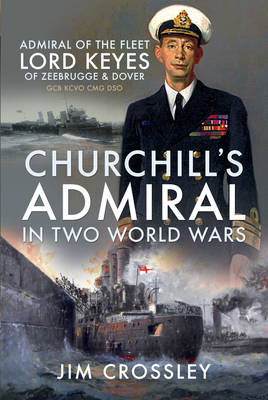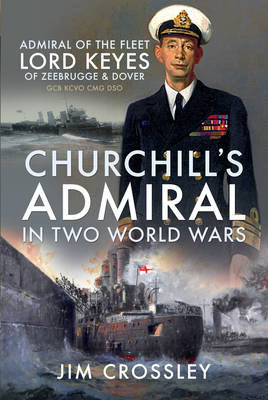
- Afhalen na 1 uur in een winkel met voorraad
- Gratis thuislevering in België vanaf € 30
- Ruim aanbod met 7 miljoen producten
- Afhalen na 1 uur in een winkel met voorraad
- Gratis thuislevering in België vanaf € 30
- Ruim aanbod met 7 miljoen producten
Zoeken
Churchill's Admiral in Two World Wars
Admiral of the Fleet Lord Keyes of Zeebrugge and Dover Gcb Kcvo Cmg Dso
Jim Crossley
Paperback | Engels
€ 22,45
+ 44 punten
Omschrijving
A full and detailed biography of Roger Keyes, Admiral of the Fleet and Lord of Zeebrugge and Dover.
Roger Keyes was the archetype of 19th to 20th century Royal Navy officers. A superb seaman, inspiring leader and fearless fighter he immediately caught the eye of senior figures in the naval establishment as well as the up and coming politician, Winston Churchill. The relationship between these two brave men survived disappointment, disagreement and eventually disillusion. Unlike some of his contemporaries Keyes was unable to make the transition from sailor to politician and was inclined to embarrass his friends and allies by his intemperate language and total lack of political acumen. Always eager to lead from the front and hurl himself at the enemy his mind set tended to be that of a junior officer trying to prove himself, not that of a senior Admiral.
Trained in some of the last of Britain's sailing warships, Keyes served in submarines in the North Sea, destroyers in China and as a senior staff officer in the disastrous Gallipoli campaign. As commander of the Dover Patrol he planned and led the highly controversial Zeebrugge Raid and successfully combated U-boats passing along the English Channel. In World War II he begged to be given a combat command but, in spite of their close personal friendship, Churchill realised that he was too old to be suitable for a front line role and his undisguised contempt for many senior Naval and Airforce officers made him extremely unpopular in official circles.
To his credit, Churchill did not let his personal friendship and admiration of Keyes blind him to his temperamental and intellectual limitations. Both men were big enough not to let professional conflict destroy mutual personal admiration and friendship.
Roger Keyes was the archetype of 19th to 20th century Royal Navy officers. A superb seaman, inspiring leader and fearless fighter he immediately caught the eye of senior figures in the naval establishment as well as the up and coming politician, Winston Churchill. The relationship between these two brave men survived disappointment, disagreement and eventually disillusion. Unlike some of his contemporaries Keyes was unable to make the transition from sailor to politician and was inclined to embarrass his friends and allies by his intemperate language and total lack of political acumen. Always eager to lead from the front and hurl himself at the enemy his mind set tended to be that of a junior officer trying to prove himself, not that of a senior Admiral.
Trained in some of the last of Britain's sailing warships, Keyes served in submarines in the North Sea, destroyers in China and as a senior staff officer in the disastrous Gallipoli campaign. As commander of the Dover Patrol he planned and led the highly controversial Zeebrugge Raid and successfully combated U-boats passing along the English Channel. In World War II he begged to be given a combat command but, in spite of their close personal friendship, Churchill realised that he was too old to be suitable for a front line role and his undisguised contempt for many senior Naval and Airforce officers made him extremely unpopular in official circles.
To his credit, Churchill did not let his personal friendship and admiration of Keyes blind him to his temperamental and intellectual limitations. Both men were big enough not to let professional conflict destroy mutual personal admiration and friendship.
Specificaties
Betrokkenen
- Auteur(s):
- Uitgeverij:
Inhoud
- Aantal bladzijden:
- 224
- Taal:
- Engels
Eigenschappen
- Productcode (EAN):
- 9781399001564
- Verschijningsdatum:
- 22/10/2021
- Uitvoering:
- Paperback
- Formaat:
- Trade paperback (VS)
- Afmetingen:
- 152 mm x 235 mm
- Gewicht:
- 376 g

Alleen bij Standaard Boekhandel
+ 44 punten op je klantenkaart van Standaard Boekhandel
Beoordelingen
We publiceren alleen reviews die voldoen aan de voorwaarden voor reviews. Bekijk onze voorwaarden voor reviews.











